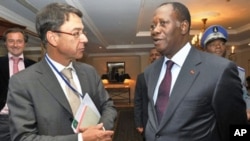Ivory Coast’s internationally recognized president-elect has described the nationalization of the country’s cocoa industry as ‘stealing’ and promised to reverse a period of economic decline.
A day after receiving a vote of confidence from the African Union, Alasanne Ouattara met with AU accredited diplomats to brief them on his plans as Ivory Coast’s next president. There was no immediate word on when he might be sworn in, though the AU Peace and Security Council ordered the head of Ivory Coast’s Constitutional Court to conduct the ceremony promptly.
Speaking to reporters Friday, the United Nations certified winner of last November's presidential elections said he would immediately undo incumbent President Laurent Gbagbo’s move to nationalize the cocoa sector. He said the takeover of an industry that produces more than 1/3 of the country’s revenue amounts to theft.
"It’s not nationalization. It’s stealing. Because clearly as they did with the banks, now they are trying to rob people, businesses, both Ivorians and foreigners. Obviously they’re not looking for the welfare of the people of Cote d’Ivoire but that will change in a few days," he said.
Ouattara’s comments echoed reaction of the United States and other countries that have condemned Gbagbo’s nationalization move. Experts, however, say the government takeover is unlikely to have much effect, since a ban was imposed on Ivory Coast’s cocoa imports after Gbagbo refused to recognize the results of the presidential runoff vote.
Ivory Coast, the world’s biggest cocoa producer, was once one of Africa’s economic giants. But the cocoa export ban is contributing to an overall economic decline during the Gbagbo years.
Reuters news agency this week quoted a high-ranking French diplomat as saying the loss of cocoa revenue and other international sanctions were contributing to a weakening of Gbagbo’s grip on power.
Ouattara, a U.S. trained economist and former deputy director of the International Monetary Fund, says his most difficult challenge as president will be healing the wounds that threaten to push Ivory Coast back to civil war. But he expressed confidence his economic experience would help restore the country to fiscal health.
"For the economy, my compatriots trust me. They know what I’ve done in the past. They know what I’ve done elsewhere in Africa and the world, when I was deputy managing director of the IMF (International Monetary Fund), and I have great plans for Cote d’Ivoire and I am confident that in a few years, the economy will be running at a very high level," he said.
But before he can tackle Ivory Coast’s economic and political crises, one of Ouattara’s first challenges will be getting home. After he flew to Addis Ababa this week, Gbagbo’s government announced a ban on flights from United Nations and French planes in an apparent attempt to block his return.
Ouattara’s camp, however, noted that the U.N. recognized president elect would be stopping in Nigeria on his trip westward for talks with President Goodluck Jonathan. They suggested he might return to Abidjan by another means. They did not elaborate.
Ouattara Says Nationalizing Ivory Coast’s Cocoa Sector is ‘Stealing’













